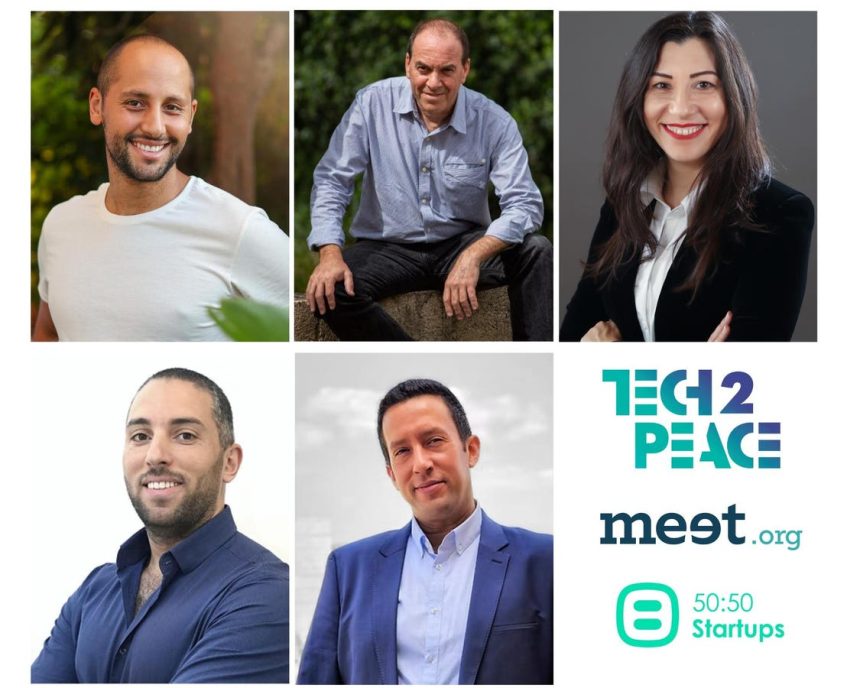In the heart of the enduring Israeli-Palestinian conflict, a counter-narrative of hope and collaboration is quietly unfolding. Organizations like Tech2Peace, MEET (Middle East Entrepreneurs of Tomorrow), and 50:50 Startups are defying the prevailing narrative of division by fostering bridges of understanding and shared prosperity through technology, education, and entrepreneurship. These initiatives bring together Israelis and Palestinians, encouraging dialogue, trust, and mutual growth, offering a powerful testament to the potential for human connection even in the most fractured of environments. Leading these efforts are individuals like Yaniv Sagee, CEO of MEET; Hela Lahar, CEO of Tech2Peace; Adnan Jaber, board member at Tech2Peace and founder of PeaceTech Affinity Group; Marwan Meqbil, Director of 50:50 Startups; and Shai Friedman, CEO of 50:50 Startups. Their combined experiences and unwavering commitment demonstrate that fostering dialogue and empowering individuals can pave the way for a more equitable and peaceful future, even amidst seemingly insurmountable challenges.
Each of these organizations arose from a shared recognition that traditional peacebuilding approaches were falling short. MEET was born during the Second Intifada, when three young Israelis recognized the potential of technology education to bridge divides. Initially focused solely on computer science and entrepreneurship, the program quickly evolved to incorporate a crucial third pillar: dialogue and deeper understanding. This holistic approach, combined with the allure of MIT affiliation, fueled MEET’s expansion from Jerusalem to the West Bank and northern Israel. Tech2Peace, founded on the principle of leveraging technology to disrupt entrenched conflict cycles, also underwent a significant transformation. Initially a series of intensive seminars, the organization shifted its focus to building a vibrant alumni community, creating a sustainable network for ongoing connection and collaboration. 50:50 Startups, grounded in the belief that sustainable peace requires individual connections, focuses on venture creation and technological innovation as vehicles for fostering shared success. Their approach emphasizes practical collaboration, enabling Israelis and Palestinians to benefit from each other’s expertise and build relationships based on mutual respect and shared goals.
The personal journeys of the leaders behind these initiatives highlight the transformative power of cross-community engagement. Marwan Meqbil, raised in a refugee camp with ingrained resistance to interaction with Israelis, experienced a profound shift in perspective after joining an organization that facilitated such encounters. His initial skepticism gave way to a nuanced understanding of the complexities of the conflict and a commitment to fostering opportunities for Palestinian youth. Adnan Jaber’s path to peacebuilding was equally personal, stemming from his own experiences of isolation and mistrust. Joining Tech2Peace, he overcame his initial apprehension and formed meaningful friendships with Israelis, sparking a passion for fostering understanding and dialogue.
The success of these initiatives is evident in both tangible outcomes and intangible shifts in perspective. MEET boasts alumni who have pursued studies at MIT and launched startups addressing pressing societal challenges, including navigation solutions for the West Bank and resources for trauma survivors. Tech2Peace has cultivated a thriving alumni network with a high engagement rate, spawning successful ventures like Dana Global, a desert tech solutions accelerator. 50:50 Startup’s decision to host its program in Cyprus, necessitated by travel restrictions, inadvertently fostered deeper connections by placing both Israelis and Palestinians in a shared “foreign” environment, highlighting the adaptability and resourcefulness of these organizations in navigating complex circumstances.
Operating within a highly charged political climate, these organizations inevitably face criticism and skepticism from both sides of the divide. Tech2Peace confronts questions about the relevance of their work in times of heightened conflict, while proponents of these initiatives emphasize their focus on practical impact and long-term relationship building. Addressing concerns about normalization, leaders stress the importance of education and dialogue as fundamental rights, distinguishing these pursuits from condoning human rights abuses or accepting the status quo. The organizations navigate the complexities of free speech and varying perspectives on the conflict by fostering “brave spaces” for dialogue and encouraging empathetic understanding.
The ongoing conflict presents significant operational challenges, particularly for maintaining connections and fostering trust. Despite the escalating tensions, these organizations remain committed to their mission, providing spaces for dialogue and emotional processing, helping participants navigate the psychological toll of conflict. Leadership during these challenging times requires agility, adaptability, and a commitment to identifying and nurturing true partnerships. While acknowledging the difficulties, leaders view these disruptions as opportunities for innovation and growth, strengthening the organizations’ resolve and clarifying their mission.
Despite the pervasive atmosphere of conflict, these organizations remain steadfast in their belief that their work is laying the groundwork for eventual peace. They recognize that civil society plays a crucial role in post-conflict scenarios, emphasizing the importance of building the infrastructure and relationships necessary for future reconciliation. By fostering collaboration and cultivating a new generation of leaders equipped with empathy and problem-solving skills, these organizations are nurturing the seeds of hope for a more peaceful and prosperous future. Through technology, education, and entrepreneurship, they are demonstrating that connection is not only possible but essential, even in the midst of war, offering a powerful testament to the enduring human capacity for bridge-building and shared progress.



